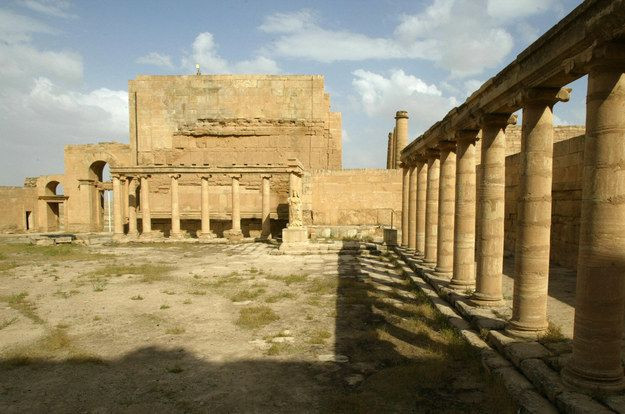ISIS Demolishes Hatra, 2,000-Year-Old City In Ancient Iraq

The Islamic State group has demolished yet another jewel of Iraqi antiquities -- this time, it was the ancient city Hatra in northern Iraq about 70 miles south of an ISIS stronghold in Mosul. The United Nations has condemned the attack and called it “a turning point,” Reuters reported.
"The destruction of Hatra marks a turning point in the appalling strategy of cultural cleansing under way in Iraq,” Irina Bokova, head of the U.N. cultural agency Unesco, told Reuters Saturday.
The extent of the damage at Hatra is still unclear. But an Iraqi resident reported hearing loud blasts at the 2,000-year-old archaeological site early Saturday. Saeed Mamuzini, spokesman for the Mosul branch of the Kurdish Democratic Party, said the members of the Islamic State group -- formerly known as ISIS or ISIL -- used explosives to blow up buildings at Hatra and were also bulldozing parts of the site, Reuters reported.
"This is a very historical site and many popular kings ruled in the city," Mamuzini told Rudaw, a Kurdish media network. “The city of Hatra is very big and many artifacts of that era were protected inside the site. ISIS has already taken away all the ancient currencies from the city that are in gold and silver.”
The temples at Hatra are famous for their blend of Hellenistic and Roman architecture with Eastern decorative elements, according to Unesco, which lists the city as a world heritage site. The ancient city was built around 200 B.C. by the Seleucid empire, which controlled swaths of the ancient world conquered by Alexander the Great. Hatra is about 180 miles northwest of Baghdad, and was considered one of the best preserved examples of a Parthian city, according to the Iraqi Cultural Center in Washington.
"This is a direct attack against the history of Islamic Arab cities, and it confirms the role of destruction of heritage in the propaganda of extremists groups," Bokova said in a joint statement with Abdulaziz Othman Altwaijri, director general of the Islamic Educational, Scientific and Cultural Organization, according to Reuters.
The Iraqi Ministry of Tourism and Antiquities blamed a lack of swift international response to earlier ISIS attacks on Iraqi antiquities for the latest incident. "The delay in international support for Iraq has encouraged terrorists to commit another crime of stealing and demolishing the remains of the city of Hatra," the ministry said in a statement obtained by Reuters.
The attack comes just two days after the Islamist extremists “bulldozed” the ancient Assyrian city of Nimrud, which was built in the 13th century B.C., during the Middle Assyrian Empire. Last week, ISIS militants were seen on videotape smashing 3,000-year-old stone sculptures and other priceless cultural treasures with sledgehammers in the Mosul Museum.
Unesco strongly condemned the attack at Nimrud Friday, urging the international community to put an end to the "catastrophe."
“The deliberate destruction of cultural heritage constitutes a war crime,” Bokova said in a statement. “I call on all political and religious leaders in the region to stand up and remind everyone that there is absolutely no political or religious justification for the destruction of humanity’s cultural heritage."
ISIS has declared its intention to destroy pre-Islamic artifacts that offend its religion. "These ruins that are behind me, they are idols and statues that people in the past used to worship instead of Allah," one ISIS militant said in the video. "The Prophet Muhammed took down idols with his bare hands when he went into Mecca. We were ordered by our prophet to take down idols and destroy them, and the companions of the prophet did this after this time, when they conquered countries.”
© Copyright IBTimes 2025. All rights reserved.





















